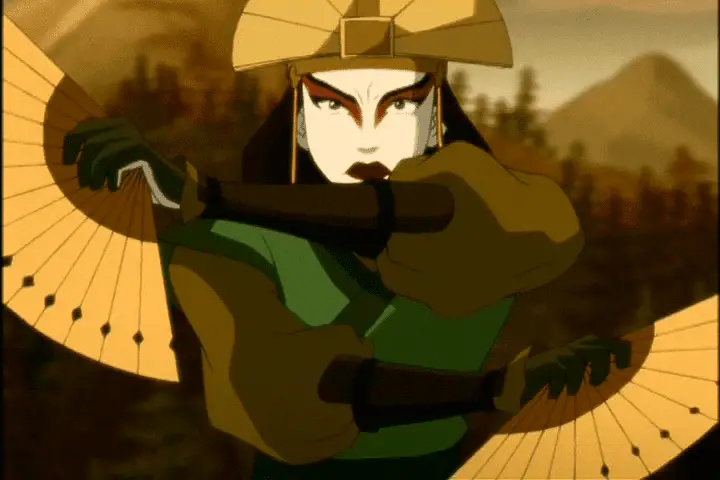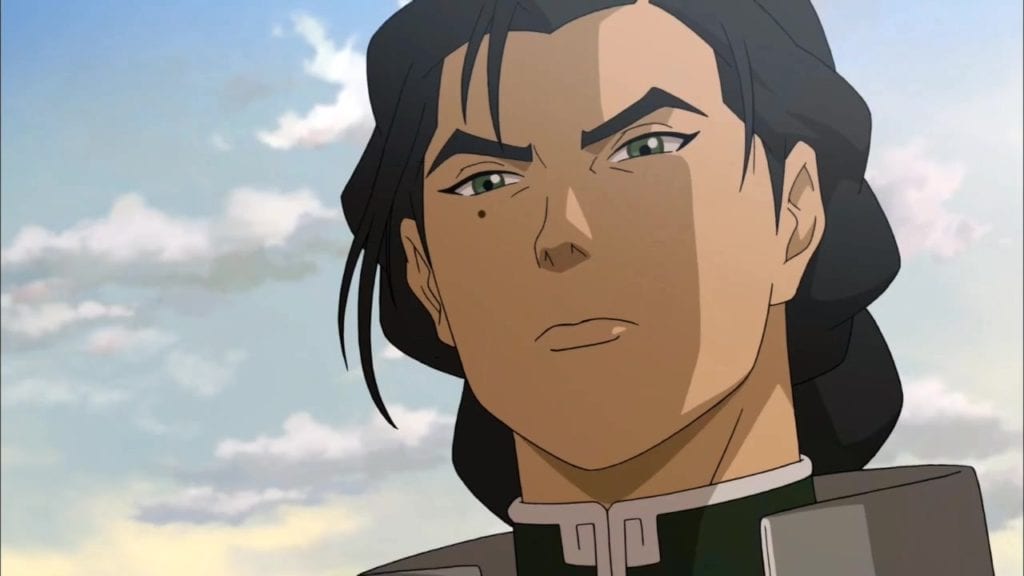Despite her very limited appearances, Avatar Kyoshi emerged from Avatar: The Last Airbender as a fan favorite. She was so different from Aang, the uncertain pacifist airbender boy. Kyoshi was a fully-realized Avatar. A grown woman at the peak of her powers who showed a ruthless side shocking to both Aang and the audience. Ever since we saw her create Kyoshi Island, fans have wanted to know more.
Last month saw the release of the first of multiple planned novels telling us more of Kyoshi’s story. The Rise of Kyoshi is a must-read Avatar story for multiple reasons. The world building is stunning and provides the most detailed look at the Earth Kingdom to date, and the amount of new lore stuffed in surprising. Its plot is a mature and well-written political game. Brutal bending techniques provide a level of violence contextualizing Kyoshi’s greater ruthlessness, but without crossing any lines into gratuitousness.
The star of the show, though, as you’d expect, is Kyoshi. Author F.C. Yee absolutely nailed her character arc and personality, living up to the high standards that only climbed higher with each year and each new Avatar story.

We learn a lot about the towering, powerful, bisexual Earth Cycle Avatar. She’s a bit of a neat freak. Her parents abandoned her at the age of 7. She doesn’t find out she’s the Avatar until the age of 16. While surprisingly adept at large-scale bending feats, she is almost entirely incapable of bending small objects until she begins using her iconic war fans. In contrast to the assured Avatar we see in The Last Airbender, Kyoshi spends her debut novel as a barely suppressed ball of fear and anxiety.
Among the many things we learned about her, though, something struck me about halfway through the novel. You read the title, you know what I’m going to say. Kyoshi strikes me as very similar to Kuvira.
The base similarities are probably obvious just from reading my brief description. Just that both are earthbender orphans with restrained personalities and a capacity for violence begs some comparison. It goes deeper than that, though. After finishing The Rise of Kyoshi, I felt like you could switch Kyoshi and Kuvira in time or ability and see them make the same choices the others did. Maybe it is an earthbender thing.
Both characters struggle deeply with the insecurities of finding family due to their abandonment. Kyoshi spends an unspecified amount of time homeless, persecuted, and suffering before an airbending master named Kelsang, companion of the deceased Avatar Kuruk, gives her a home with the misidentified Avatar named Yun. When Kyoshi realizes she may be the Avatar, she desperately does not want to believe it. Kelsang, Yun, and her firebender friend Rangi have become her family and she desperately does not want to lose them. Nothing means more to Kyoshi. It is the loss of this family that sends her on the path of revenge
Kuvira undergoes something similar, though we know less of the details. The latest Legend of Korra comic, Ruins of the Empire, shows a child Kuvira run away from home, and Kuvira considers herself as having been abandoned by her parents, begging the question of what exactly happened. Suyin Beifong takes her in at 8-years old. The Beifongs serve as her family. She clearly feels some of the same loyalty to them that Kyoshi feels for Kelsang, Yun, and Rangi. Her split from them plays a significant role in her eventual fascist descent. She loses her moral guidance.
This emphasis on finding a place where they belong drives both characters. Kuvira’s motivation for establishing the Earth Empire seems driven by the need to stop the chaos present after the Earth Queen’s assassination. She wants to prevent more kids from ending up like her. As we see in Book 4 of Korra, this takes her down a corrupt path towards fascism. Her motivations do not excuse her actions, of course, but they provide context for her decisions.
Kyoshi undergoes something similar. Even once she accepts that she is the Avatar and Yun is not, she maintains relentless loyalty to him. After tragedy takes her family from her, her motivation for the rest of the novel rests on seeking revenge for her family. She walks down her own dark path, one casting aside the law and order of another of Kuruk’s companions in favor of the bandit gang her parents led. Kyoshi even flirts with the possibility of assassinations. In the end she manages to restrain herself. However, we see the beginnings of the woman who so assuredly advises Avatar Aang to take Fire Lord Ozai’s life.
Considering Kyoshi eventually establishes the Dai Li, a secret police force dedicated to “law and order” in the Earth Kingdom, she comes to somewhat similar conclusions to Kuvira about how to protect her nation.
Their world states are also quite similar, in ways realistically developing them in similar ways. Kyoshi is born into a world reeling from the premature death of Avatar Kuruk. Compounded with the struggles to find a new Avatar, and Kyoshi grows up in an Earth Kingdom plagued by powerful bandits taking advantage of fractured,, uncertain leadership and a lack of an Avatar to set things right. It doesn’t matter that the Avatar would not be old enough to really do anything, even if they were found. We see in the novel how the simple existence of one is enough to curtail bandits who otherwise pursue violence and power with reckless abandon.
Sounds familiar, right? Kuvira begins the campaign that ends with the establishment of the Earth Empire specifically because of unchecked corruption and bandit aggression following the Earth Queen’s death, a problem also made worse by the absence of the Avatar. Both Kyoshi and Kuvira developed a more ruthless, pragmatic sense of justice because of Earth Kingdom anarchy.
While Kuvira’s sins exceed Kyoshi’s, both approach violence and death with similar mindsets. I never got the sense that Kuvira was murderous or took particular pleasure in death. Perhaps the medium influences my view. Nickelodeon was never going to show Kuvira’s army murdering people in her “reeducation camps” despite the easy inference that such a thing happened. Widespread death must have occurred during her 3 years conquering the Earth Kingdom.
Looking at Kuvira herself, though, killing was never really her first choice in any scenario. Of course, she did not shy away, either.
When Kuvira defeats Korra outside of Zaofu, she clearly suffered no qualms about killing Korra afterwards. Her decision to fire on the building where Team Avatar holds Baatar Jr. hostage also occurs with the same ruthless, evil calculation of the cost of human lives. Losing Baatar was worth the chance to end the leadership opposing her efforts to take Republic City. Neither choice was made with any particular glee or blood lust, though. Rather, I believe they were made as part of a detached, misguided sense of necessity developed throughout her war, where she viewed human cost as cold calculation.

At some point, Kuvira changed from the Zaofu guard rescuing Tonraq to the dictator who fired a spirit cannon indiscriminately upon Republic City and created concentration camps. We don’t see this part of her journey. It does exist, though, and we can reasonably guess how it went down.
I think we see something like that begin with Kyoshi in her novel. Now from what we know, Kyoshi never does anything like what Kuvira does. She does go down a darker, more ruthless path than any other Avatar we know about, though. Her stated goal throughout The Rise of Kyoshi is the death of someone who betrayed her. A member of her Team Avatar influences her towards taking lives. She nearly kills in one case, and shortly afterwards kills someone else. For good reason, to be sure, but it’s still a clear progression of her character towards the willingness to kill.
Considering their similarities in so many areas, I think we can use Kyoshi’s beginning and Kuvira’s end to piece together what we don’t know about both. It’s possible that future novels will separate them further. Right now, it’s not difficult at all to imagine a non-Avatar Kyoshi being in Kuvira’s place and reaching the same conclusions Kuvira did. Likewise, I can easily imagine Kuvira being in Kyoshi’s place and feeling the same way. Their decisions and personalities come across too similarly for me to think otherwise.
To return to Kyoshi’s creation of the Dai Li, I think Kyoshi eventually reaches a similar conclusion regarding the archaic, ineffective governance of the Earth Kingdom. She grows up and eventually reached Avatarhood in a fractured, corrupt, useless nation that does wrong by its citizens. The most united she has seen yet is under the thumb of Jianzhu, another companion of Avatar Kuruk, who uses force, brutal violence, and corruption to hold the Earth Kingdom together the best he could. I can believe that she came to recognize some good in Jianzhu’s actions. Despite her hatred for him, the Dai Li were a method by which she tried to replicate his successes.
Kuvira also viewed the Earth Kingdom as outdated and ineffective. She viewed the most successful future of her homeland as one united under a single command, where all of the vast nation’s resources blend and commit towards a common mission of Earth Empire glory. Kyoshi is really not that far off from the same belief.
In fact, I think the only reason she avoids the same thing is because of her Avatarhood. It lends a greater spiritual responsibility to her life that just barely keeps her off Kuvira’s path. And she still needs the constant reminder and influence of her friend and love interest, Rangi, to keep her on the Avatar path.
Take into consideration the many similarities between Kyoshi and Kuvira. If Kuvira was born the Avatar, could you not see her restraining herself and becoming more like Kyoshi, rather than the disgraced path she takes? Kuvira already draws considerable comparisons to another Avatar in Korra. Kyoshi is just another example for Kuvira to compare to, even more than Korra.
I would love to know how much of this was intentional. Did F.C. Yee draw inspiration from Kuvira and Book 4 of Korra? Did Michael DiMartino influence him in this direction while advising on the novel? Was it coincidence? Some fortunate accident resulting from characterization and worldbuilding consistent with the Earth Kingdom we know from The Last Airbender and The Legend of Korra?
Whatever the case, I found these many similarities between Kyoshi and Kuvira to be one of my favorite aspects of The Rise of Kyoshi.
There are many reasons why any Avatar diehard owes it to themselves to read this novel. Maybe this Kuvira comparison makes you more interested. Maybe not. You should go read it anyway—it’s great.

